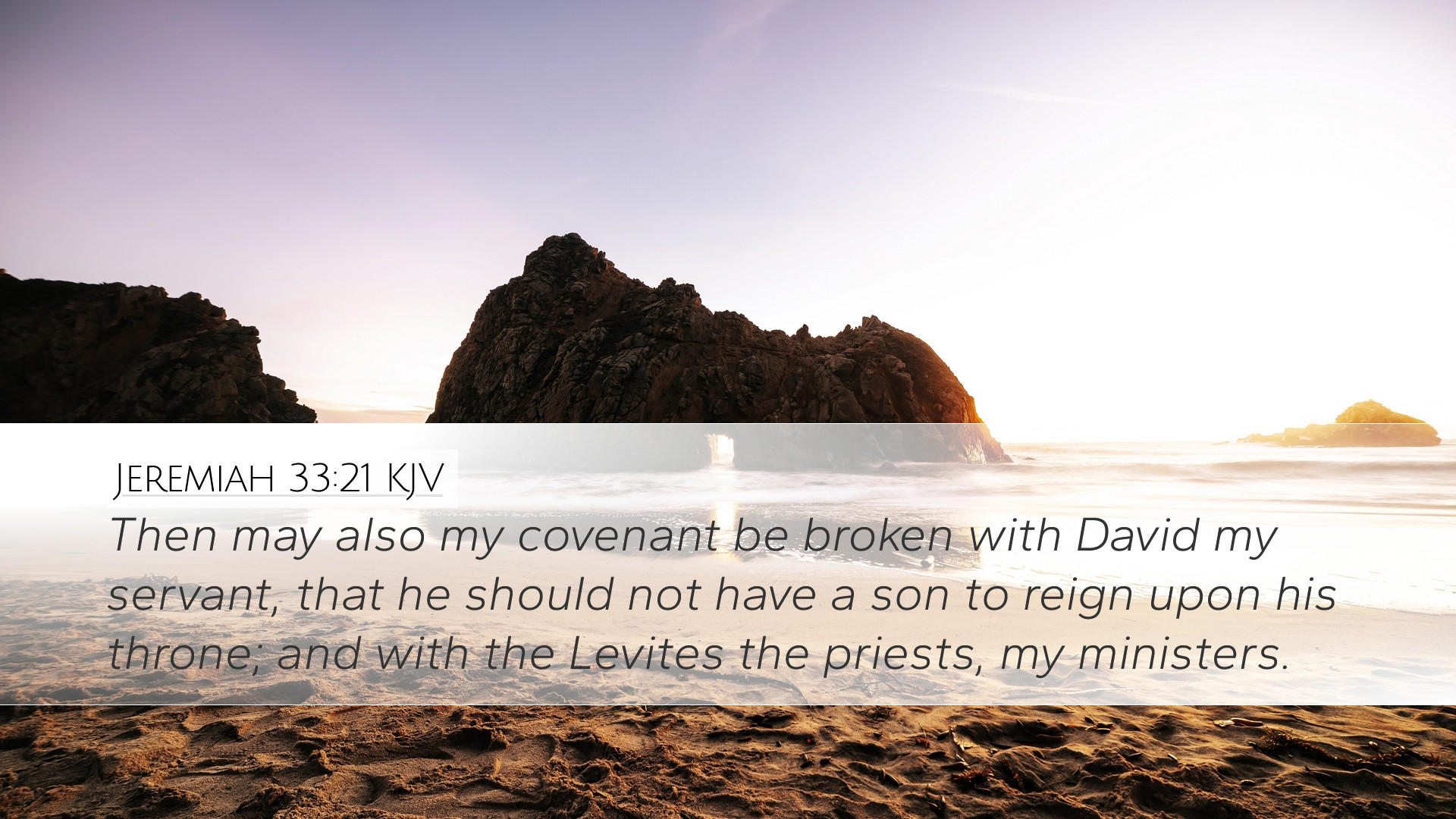Commentary on Jeremiah 33:21
Verse: Jeremiah 33:21 - "Then may also my covenant be broken with David my servant, that he should not have a son to reign upon his throne; and with the Levites the priests, my ministers."
Introduction
This verse is crucial as it expresses the unwavering promise of God concerning the Davidic covenant. The context of Jeremiah’s prophecy is during a time of despair for the nation of Israel, specifically in light of the Babylonian captivity.
Exegesis and Analysis
The fundamental themes of this scripture involve the certainty of God's promises and the eternal nature of His covenants. The verse explicitly states that the covenant with David will not be broken, highlighting God's fidelity even when His people are unfaithful.
The Covenant with David
Matthew Henry emphasizes that God's promises are established regardless of human failure. He notes that David's lineage is central to the Messianic promise and that the assurance of David's heirs on the throne is an eternal decree by God.
Albert Barnes draws attention to the certainty of David's descendants being in authority, which signifies the continuity of leadership derived from divine appointment. His observations point out that even in the face of apparent national disaster, God's commitment remains unshakeable.
Adam Clarke connects this covenant to the greater covenant of grace through Jesus Christ, emphasizing that the reign of David's throne ultimately culminates in Christ, whose Kingdom will have no end (Luke 1:32-33). Clarke also notes how this covenant provides hope for the restoration of Israel post-exile.
The Role of the Levites
The second aspect mentioned is the covenant with the Levites, illustrating God’s promise towards the priestly line. Henry points out that the priests play a crucial role in mediating between God and the people, and their ongoing service is anchored in divine decree.
Barnes adds that the mention of Levites ensures that there will always be leaders who guide the spiritual health of the nation, underlining the importance of a consistent and divinely sourced leadership.
Clarke further explores the implications of the promised enduring priesthood, suggesting that true spiritual ministry is rooted in faithfulness to God’s covenant. He stresses that God’s calling always comes with promises of sustenance and support for His ministers.
Theological Implications
This verse has profound theological implications, particularly concerning the nature of God's faithfulness. It serves as a powerful reminder that God’s promises endure beyond human circumstances and failures.
- Unbreakable Promises: The text asserts that God's covenant is unbreakable; it serves as a foundation for trusting in His plans even during instabilities.
- Hope of Restoration: The prophecy delivered through Jeremiah becomes a beacon of hope, signaling to Israel that restoration is possible under God’s future redemption.
- Covenantal Faithfulness: The verse points believers to the greater New Covenant established in Christ, where all of God's promises find their fulfillment.
Practical Applications
This scripture serves as a guide for pastoring, education in theological institutions, and personal study. Here are several practical applications:
- Assurance in Trials: Believers can find solace in the consistency of God’s promises, particularly during personal or communal crises.
- Importance of Legacy: The mention of David's lineage signifies the value of spiritual heritage and the impact of leadership on future generations.
- Commitment to God's Work: Ministers and church leaders ought to remain steadfast in their duties, aware that their work is undergirded by God’s everlasting commitment to His people.
Conclusion
Jeremiah 33:21 provides a rich tapestry of theological insight and practical wisdom. The enduring nature of God's covenants assures us that, despite the tumultuous circumstances of life, God's faithfulness is unwavering. As students of scripture and leaders in the church, we are called to reflect on the implications of this promise and to live out our faith with the boldness that comes from knowing that our God does not break His covenants.


